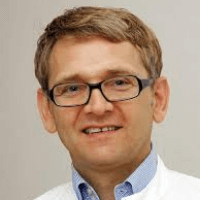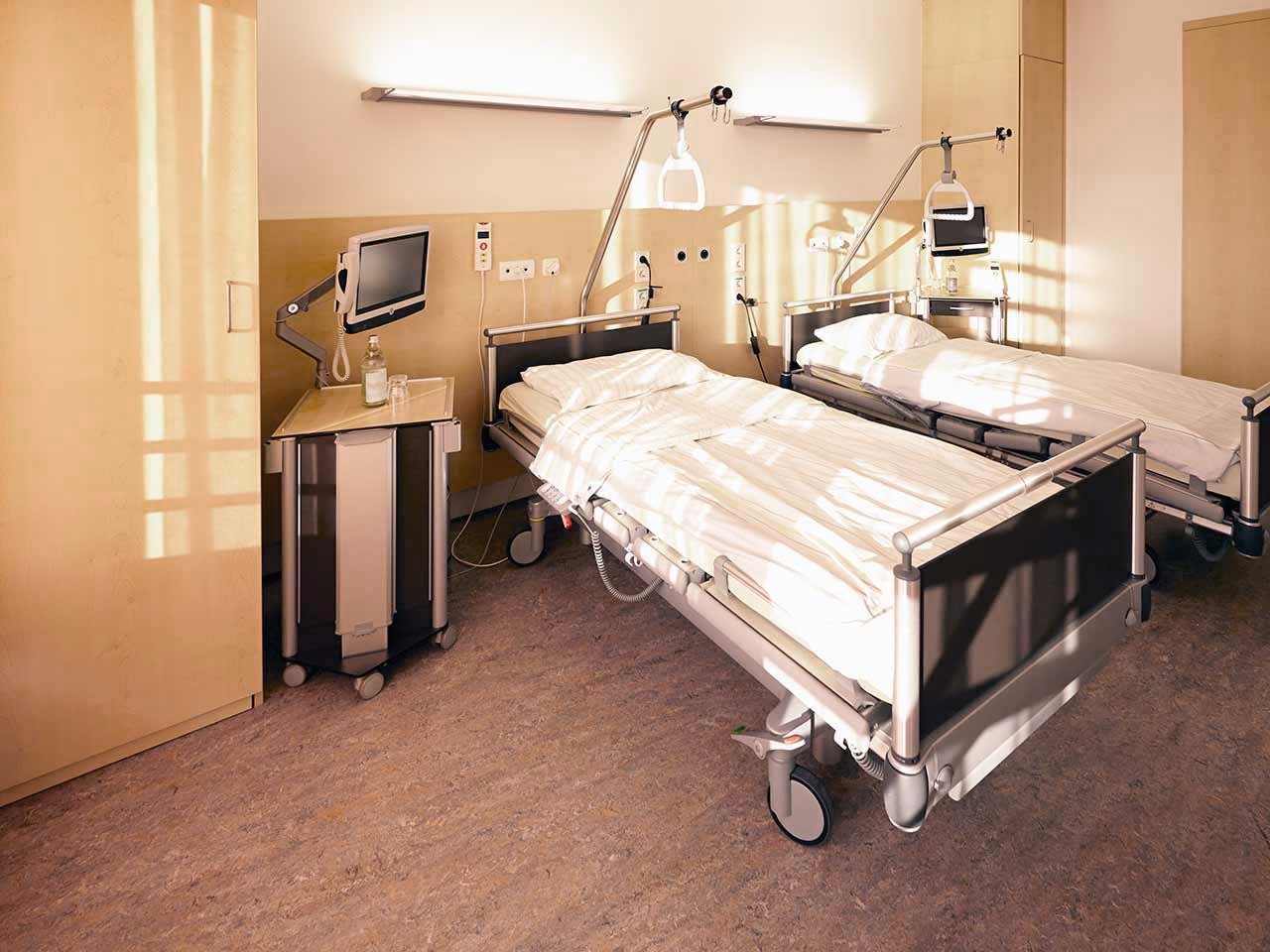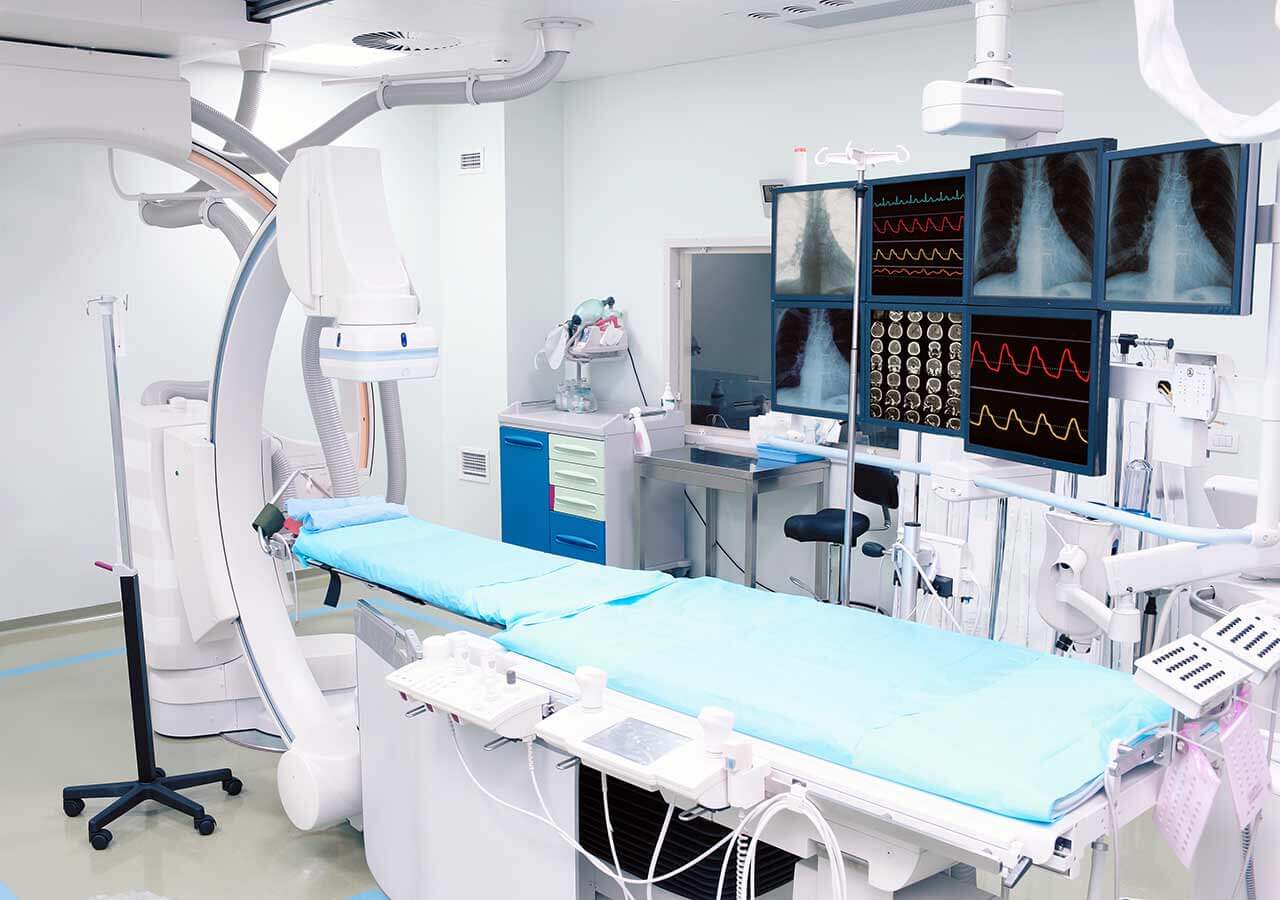
About the Department of Adult and Pediatric Gynecology, Mammology, Reproductive Medicine at University Hospital Jena
According to Focus, the Department of Adult and Pediatric Gynecology, Mammology, Reproductive Medicine at the University Hospital Jena ranks among the top German medical facilities specializing in breast cancer treatment!
The department offers the full range of surgical and conservative treatment of diseases of the female reproductive system. One of the priorities is breast cancer treatment. Other important focuses include the treatment of gynecologic cancers, endometriosis, uterine myomas, dysplasia, pelvic prolapse, urinary incontinence. In addition, the competence covers the use of all modern assisted reproductive technologies. The department is headed by Prof. Dr. med. Ingo Bernard Runnebaum.
In the field of gynecology, of particular interest is the diagnostics and treatment of oncological diseases of the female genital sphere, for example, uterine, cervical, ovarian cancers, etc. The department's surgeons annually perform more than 250 interventions for the treatment of such pathologies. Thanks to the excellent technical equipment, many operations are carried out using sparing minimally invasive techniques. The decision on the most effective treatment concept is made at interdisciplinary tumor boards with the participation of the experienced gynecologists, radiation therapists, radiologists, oncologists, as well as representatives of clinical trials.
Another key focus of the department’s work is breast cancer therapy. The department offers all progressive diagnostic methods for the early detection of pathology. In addition, the department implements a special breast cancer screening program, which allows to detect the disease as soon as possible and to ensure the proper treatment. In many cases, the doctors manage to deal with breast cancer using organ-sparing surgical techniques, but some clinical cases still require breast resection. Nevertheless, the department's range is complemented by modern reconstructive operations, which allow the doctors to guarantee a good aesthetic result.
In addition, the competence includes the diagnostics and treatment of infertility in women, hormonal disorders in patients of all age groups, including girls, medical care in puberty disorders, as well as during menopause. In the case of problems with conception, the doctors conduct in vitro fertilization, intracytoplasmic sperm injection. In some cases, it is enough to monitor the menstrual cycle and ovulation, which allows for the promotion of natural conception without additional manipulations.
The service range of the department includes:
- Diagnostics and treatment of gynecologic cancers
- All gynecological interventions
- Special operations (laparoscopic radical surgery with the preservation of nerves and/or organs)
- Multivisceral surgery at the advanced stages of oncopathology
- Cryopreservation of eggs for fertility preservation
- Reconstructive surgery on the reproductive organs
- Radiation therapy
- Chemotherapy
- Antibody therapy
- Immunotherapy
- Hormone therapy
- Treatment within the clinical trials
- Psycho-oncological support
- Second opinion
- Naturopathic methods and nutrition counseling
- Diagnostics and treatment of breast cancer
- Diagnostics
- Breast cancer screening
- Clinical examination
- Sonography and mammography
- Biopsy
- Magnetic resonance imaging
- Therapy
- Surgical treatment
- Chemotherapy
- Radiation therapy
- Follow up care
- Treatment within the clinical trials
- Naturopathic methods
- Diagnostics
- Diagnostics and treatment of urinary and fecal incontinence
- Diagnostics
- Ultrasound diagnostics for the assessment of bladder function and the degree of uterine prolapse
- Cystoscopy and endoscopic examination of the rectum in the case of hemorrhage, incontinence or infection
- Urodynamic diagnostics with the evaluation of urine loss and differentiation of stress and imperative urinary incontinence
- Anal sphincter manometry in functional impairment after childbirth
- Defecography in fecal incontinence or emptying disorders due to pelvic prolapse
- Therapy
- Correction of pelvic prolapse (with and without organ preservation)
- Anterior and posterior colporrhaphy
- Apical fixation
- Amreich-Richter fixation
- Laparoscopic sacropexy using a special mesh
- Vaginal sacropexy (colporectosacropexy)
- Imposition of a special mesh through vaginal access in prolapse recurrence
- Treatment of urinary incontinence
- TVT procedure
- Colposuspension after Burch procedure (open or laparoscopic)
- Bulkamid™ paraurethral injection
- Botox injections
- Special treatment methods
- Anal sphincter reconstruction after birth injuries
- Incisional gynecological hernia repair
- Surgery to treat hemorrhoid due to pregnancy
- Correction of pelvic prolapse (with and without organ preservation)
- Diagnostics
- Diagnostics and treatment of endometriosis
- Diagnostics
- Study of medical history and gynecological examination
- Imaging diagnostics (MRI)
- Diagnostic procedures of the urological range (for example, pyelography)
- Diagnostic procedures of the gastroenterological range (proctoscopy, rectal endosonography, irrigoscopy)
- Cystoscopy
- Gynecological laparoscopy with biopsy and subsequent histological examination
- Therapy
- Drug therapy
- Surgical interventions (mainly endoscopic minimally invasive surgical techniques)
- Follow-up consultations
- Interdisciplinary medical care in extragenital infection
- Diagnostics
- Diagnostics and treatment of uterine fibroids
- Diagnostics
- Ultrasound diagnostics
- MRI
- Hysteroscopy
- Laparoscopy
- Therapy
- Therapy with the uterus preservation
- Uterine fibroid enucleation
- Uterine fibroid embolization
- Radiofrequency ablation
- HOLA laser procedure
- Drug therapy
- Diagnostics
- Diagnostics and treatment of cervical dysplasia
- Diagnostics and treatment of pathological changes of the cervix, vagina and vulva
- Diagnostics and treatment of HPV infection
- Recommendations for HPV vaccination
- Treatment of genital warts
- Treatment of vulvar pain syndromes
- Plastic, reconstructive and aesthetic surgery
- Reconstructive breast surgery
- Breast reconstruction using the patient’s own tissues
- Breast reconstruction using implants
- Nipple reconstruction
- Breast asymmetry correction
- Preventive breast removal with the subsequent reconstruction
- Aesthetic surgery
- Breast surgery
- Breast augmentation
- Breast reduction
- Inverted nipple correction
- Gynecomastia surgery
- Abdominoplasty
- Thigh lift
- Arm lift
- Liposuction
- Breast surgery
- Other operations
- Hyperhidrosis correction
- Scar revision
- Aesthetic surgery of the external genitalia
- Labia correction
- Labia augmentation
- Pubic correction
- Reconstructive breast surgery
- Diagnostics and treatment of infertility
- Stimulation of natural conception
- In vitro fertilization (IVF)
- Intracytoplasmic sperm injection (ICSI)
- Cryopreservation of eggs
- Insemination
- Testicular sperm extraction
- Assisted hatching
- Polarization microscopy
- Preservation of fertility in women and men
- Diagnostics and treatment of hormonal disorders in women and girls
- Menopause, including early menopause
- Endometriosis
- Menstrual disorders
- Contraception
- Hirsutism and hair loss due to the hormonal disorders
- Decreased libido
- Puberty disorders
- Other medical services
Curriculum vitae
Since 1980 till 1982 Dr. Runnebaum studied Philosophy and Chemistry in Heidelberg, whereas since 1982 till 1988 he studied Human Medicine at the Universities of Mainz, Berlin and Munich. Since 1989 till 1992, he was a Postdoctoral Fellow at the Salk Institute for Biological Studies in San Diego, where he became a Member of the Working Group on p53 gene in breast cancer, which was headed by the Nobel Prize winner Renato Dulbecco jointly with Saraswati Sukumar. In 1990, he received his Doctorate at the Ludwig Maximilian University of Munich in the Department of Dermatology and Allergology under the guidance of Otto Braun-Falco. In 1997, he had his board certification by the Medical Association of Baden-Württemberg and habilitation at the University of Ulm under the supervision of his curator Rolf Kreienberg, which gave him Venia Legendi in Gynecology and Obstetrics. Until 1999, Runnebaum worked in the Department of Gynecology at the University Hospital Ulm, after which he accepted an offer to hold the position of Professor at the University of Freiburg (he also worked here as Leading Senior Physician). This was followed by the position of Deputy Head of the department with a focus on Gynecological Surgery at the University Hospital of Ludwig Maximilian. In addition, in 2005, he received his Master's Degree in Business Administration in the New Ulm High School. In the same year, he held the position of W3 Professor at the Friedrich Schiller University Jena and Head of the Department of Adult and Pediatric Gynecology, Mammology, Reproductive Medicine (till nowadays). In addition to the successful clinical and surgical activities, Prof. Runnebaum is known for publishing more than 200 scientific works, giving over 500 lectures in Germany and worldwide, teaching and university training of doctors (ESGO congresses, etc.), as well as participation in television programs ( Sat 1, RTL, MDR Erfurt und Leipzig).
Specialization
Prof. Runnebaum is an expert in the treatment of breast cancer and gynecological tumors. He specializes in organ-sparing surgeries on the mammary gland, oncoplastic and reconstructive operations, as well as in minimally invasive surgeries for the removal of sentinel lymph nodes and pelvic organ tumors (laparoscopy in uterine myomas, deep infiltrating endometriosis, nerve‐sparing radical hysterectomy, lymphadenectomy and complex surgical interventions in cancer of the reproductive organs in combination with multivisceral surgery). In addition, he specializes in reproductive medicine, perinatal medicine and special obstetrics. His research projects focus on ovarian, cervical and breast cancer.
Scientific Сontribution
Prof. Runnebaum demonstrated the role of p53 gene (TP53) as a tumor suppressor gene in breast and ovarian cancer. In the field of clinical trials, he became the first researcher in Germany, who studied adenoviral gene therapy in patients with ovarian cancer. He led the first randomized HIPEC research using heated chemotherapy agents in ovarian cancer in Germany. After the participation in creation of the University Cancer Center Jena (2008), he founded the Endometriosis Center (2009), the University Center for Pelvic Floor Diseases and the Network for Pelvic Floor Diseases in Thuringia. In 2010, the doctor also founded the Gynecological Cancer Center Jena, and then the Thuringian Interdisciplinary Center for Uterine Myoma.
Honors
For his researches of p53 gene as a tumor suppressor and cell cycle regulator in breast cancer cells, Prof. Runnebaum won the Walter Hohlweg Prize (1994). Since 2007, he has been regularly ranked among the top German gynecologists (Focus magazine and Gute Rat rating).
Membership in Scientific Societies
- International societies
- American Association for Cancer Research (AACR), USA.
- American Society of Clinical Oncology (ASCO), USA.
- European Society for Gynecological Endoscopy (ESGE).
- European Society of Gynecological Oncology (ESGO).
- European Society of Breast Cancer Specialists (EUSOMA).
- European Group for Breast Cancer Screening.
- National Societies
- Association of Gynecologic Oncology (AGO).
- Working Group on Immunology in Gynecology and Obstetrics (AIGM)
- Working Group on Molecular Biology in Gynecology (AMF).
- Advisory Board of the International Prevention Organization (IPO).
- Professional Association of Gynecologists.
- German Working Group on Gene Therapy (DAGGT).
- German Society of Gynecology and Obstetrics (DGGG).
- German Society for Senology (DGS).
- German Cancer Society (DKG).
- German Cancer Society, Department of Experimental Cancer Research (AEK).
- Commission on Ovarian Diseases, Working Group on Gynecological Oncology.
- Commission on the Treatment of Uterine Diseases, Working Group on Gynecological Oncology.
- Commission on the Development of Therapeutic Guidelines: S3 ovarian carcinoma, S2E hysterectomy, S3 endometrial carcinoma.
- Board of the Runnebaum Foundation, Heidelberg.
Photo of the doctor: (c) Universitätsklinikum Jena





